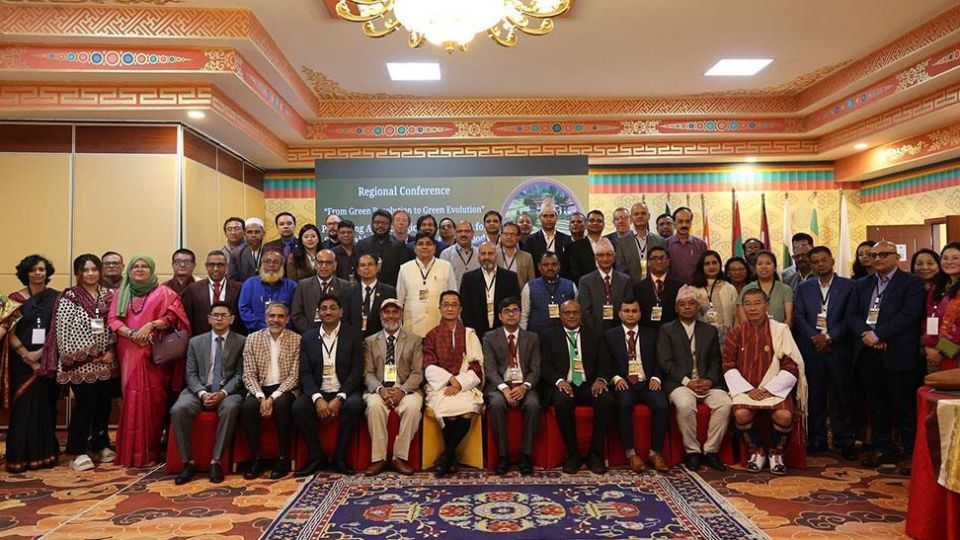August 4, 2025
THIMPHU – South Asian nations are strengthening their collaborative efforts to advance agroecology, a key focus highlighted at a recent three-day regional conference in Thimphu.
This initiative aims to transform agrifood systems by enhancing biodiversity, integrating sustainable agricultural practices into community development, and building robust value chains.
The Tarayana Foundation is leading Bhutan’s involvement in the Himalayan Agroecology Initiative (HAI), which supports the Ministry of Agriculture and Livestock agrifood system efforts.
Since HAI’s launch in May of last year, Tarayana has developed a roadmap to address challenges in remote communities, aligning with HAI’s objective to enhance climate resilience and sustainable agriculture.
The project receives financial assistance of Euro 50,000, with support from the World Future Council and IFOAM – Organics International. HAI is implemented across Bhutan, India, and Nepal, with the Tarayana Foundation at the forefront in Bhutan.
The technical director at the Tarayana Foundation, Dr Sangay Dorji, speaking at the regional conference, “Promoting Agroecological Approaches for Sustainable Transformation of Agri-food Systems in South Asia,” that concluded on Thursday, July 31, 2025, said that the South Asian countries are collaborating to mobilise markets, incentives, and financing to scale up agroecology, with a particular focus on soil improvement efforts.
Presenting on “Agroecology from the Ground Up: Field Evidence and Lessons for Transforming South Asia’s Food Systems,” he said that the Tarayana Foundation, with the Ministry of Agriculture and Livestock, is actively engaged in land management, stating that regional co-operation has played a vital role in driving these initiatives.
The project’s strategic objectives include strengthening food systems governance, enhancing access to land, water, and healthy soils, and promoting sustainable diets. Key goals also involve building climate-resilient agro-ecosystems and aiming to increase the food sector’s contribution to gross domestic product from USD 31 billion to USD 50 billion by 2029.
The initiative further targets reducing food loss and waste and harnessing digital tools in food production.
Current actions underway in Bhutan include promoting sustainable land management practices such as improved land use through strategic crop choices, rehabilitation of fallow land, and enhancing water delivery efficiency by diversifying irrigation methods, Dr Sangay Dorji said.
Soil health and challenges
Bhutan’s arable land is limited, covering about 1.8 percent of its total area.
According to Dr Sangay Dorji, soil fertility management primarily uses an integrated system combining organic and inorganic nutrients, with the country’s annual synthetic fertiliser use remaining relatively low. About 2,000 to 3,000 metric tonnes of synthetic fertilisers are used annually, which is relatively low.
However, the nation faces several soil health challenges, including land degradation due to its mountainous terrain, exacerbated by monsoons and climate change. Other contributing factors include changes in traditional land management practices, farm labor shortages, and a decline in livestock numbers, Dr Sangay Dorji said.
To address these challenges, several initiatives have been launched, including training communities in sustainable land management and vermicomposting. Under the Agriculture Land Development (ALD) program, approximately 21 acres of land have been developed, benefiting 24 households.
So far, the Tarayana Foundation’s interventions have reached over 995 villages nationwide, benefiting more than 300,000 individuals through various improvements.
Efforts to mitigate land degradation have also been carried out in Toisang Village, Barshong gewog, Tsirang.
The Tarayana Foundation’s interventions have benefited over 300,000 individuals through a range of initiatives, including improved houses for 2,652 people, access to water and sanitation for 1,171 beneficiaries, 54 spring shed management interventions, and sustainable land management of 145.05 acres.
Regional collaboration and way forward
The HAI project employs a bottom-up approach, incorporating agroecology value chains and considering gender and marginalisation.
At the country level, the Foundation reviewed 34 national policies and held consultations with dzongkhags and gewogs, aligning Bhutan’s HAI roadmap with the Agrifood Sector Strategy of Bhutan 2034 and MoAL’s 13th Plan.
An official from IFOAM – Organics International, Madhur Gandhi said that the common challenges faced by the three implementing countries, such as limited understanding of agroecology and weak research and development.
He issued a call for action for government support to scale up agroecology aligning with national goals and policies. “SAARC member countries should collaboratively take up similar projects, work on market diversification and price fixation.”
Regional experts also discussed the need for relevant Civil Society Organisations to strengthen discussions and capacity building on agroecology as a transformative food systems approach.


